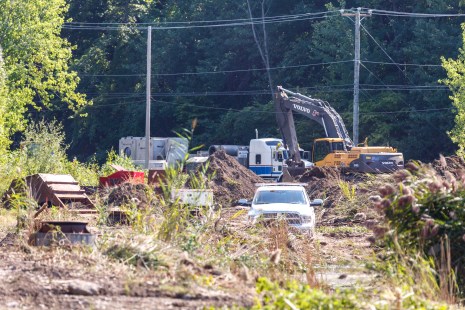
A row of ducks sat on a log in the Petit Marais Hubert Reeves on Wednesday, suspended over a foot or two of murky water while the intermittent sounds of machinery pierced through the thick greenery in Saint-Laurent’s Technoparc.
Construction on an extension of Alfred-Nobel Blvd. and a levee in the Technoparc began on Monday, while conservationists and federal and provincial Green Party representatives are calling on the research centre to respect a 500-metre border in order to protect the habitat of the endangered Least Bittern, Canada’s smallest heron.
The extension and a levee to maintain water levels in the wetlands—that will also serve as a walkway—are the first steps in the Eco-Campus Hubert Reeves development, a cleantech research centre. The first building of five is set for construction in spring 2017.
Technoparc Montreal has enlisted environmental research firm Groupe Hemispheres to consult on the development through each phase.
“There is a species at risk within 500-m,” said Don Hobus of Sierra Club Quebec. The Least Bittern has been spotted at the des Sources marsh on adjacent land owned by Aeroports de Montreal (ADM).
Sierra Club Quebec sent lawyer’s letters to both provincial and federal governments last week asking for intervention. The group has not yet heard a response, but understands these things take time. Hobus said that eventually filing an injunction to halt the development is a “real possibility.”
Double trouble
The future Reseau Electrique Metropolitain (REM) is another concern for the eco-territory. “The federal government should act doubly to protect ADM space,” said Daniel Green of the Green Party of Canada. “This sector is also being threatened by the REM.”
Original plans for the proposed light rail transit had the train entering the Technoparc in a cut-and-cover tunnel using the Alfred-Nobel Blvd. extension close to a wetland. The plan has since been changed to be underground before Alexander Fleming St. to minimize impact on the marsh. The plan is still being reviewed.
QuebecOiseaux, a non-profit for the study, observation and protection of Quebec birds, responded to the commotion surrounding the eco-campus development through a letter posted online wishing “more rigour in the information circulating concerning the project and the arguments made by the different interveners.”
Science comes first for OiseauxQuebec, wrote director general Jean-Sébastien Guénette, who met with a biologist from the city about the project in July. “Rather than opt for confrontation, we choose to use this credibility and listening to discuss with the City of Montreal and Technoparc to ensure that the natural elements present in this sector . . . are conserved in the future parc-nature des Sources.”
In the coming months the Technoparc plans to cede 10 hectares of land to the City of Montreal that will be protected and become part of the nature park.
OiseauxQuebec also wrote that they will keep an eye on plans for a bigger problem—the future Reseau Electrique Metropolitain.
